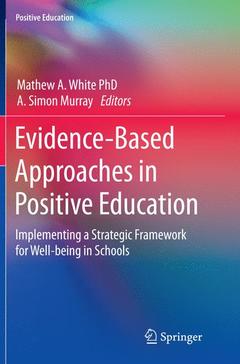Description
Evidence-Based Approaches in Positive Education, Softcover reprint of the original 1st ed. 2015
Implementing a Strategic Framework for Well-being in Schools
Positive Education Series
Language: English
Subjects for Evidence-Based Approaches in Positive Education:
Keywords
Character Strenghts in Schools; Developing Positive Psychology at Schools; Evidence-based Positive Education framework; Evidence-based strategic learning and developments; Future Directions in Positive Psychoogy and Education; Human Research Management and Building School Culture; Measurement of Well-Being at Schools; Measuring PERMA; Organisational Developments and Growth; PERMA as evidence-based approach; Positive Change in Educational Institutions; Positive Psychology and English Literature; Positive Psychology in School Counseling; Positive School Psychology; Professional and Leadership Development; St Peters College; Adelaide; Student Leadership and Positive Psychology; Suggestions Well-Being programs at schools
Publication date: 10-2016
Support: Print on demand
Publication date: 05-2015
181 p. · 15.5x23.5 cm · Hardback
Description
/li>Contents
/li>Biography
/li>Comment
/li>
Based on action research and implementation at one of the world?s great schools, this book provides a much-needed exploration of how to implement positive education at a whole school level. Evidence-Based Approaches in Positive Education summarises the integration of a whole-school mental health and well-being strategy, positive psychology programs and pastoral care models from 3 ? 18 years of age. Positive education is the teaching of scientifically validated programs from positive psychology and character education that have an impact on student and staff well-being. It is an approach that focuses on teaching, building and embedding social and emotional learning throughout a student?s experience. St Peter?s College - Adelaide is the only institution in the world to integrate Martin Seligman?s well-being theory throughout all aspects of both its strategic intent and positive education programs. The School?s vision is to be a world-class school where all boys flourish. Its mission is to provide an exceptional education that brings out the very best in every boy. This is done within an intellectually and spiritually rich environment that nurtures international-mindedness, intercultural understanding, respect and a commitment to social justice. This book captures the developments of the St Peter?s College journey. It focuses on the integration of well-being across seven strategic goals: Academics; Well-being; Student Life; Entrepreneurship; Innovation and Partnerships; People, Culture and Change; Sustainability and Environment; Community Engagement, Advancement, and Philanthropy. A uniquely Australian school, the impact of a St Peter?s College education is to build great men: who believe safety, service and integrity and fundamental parts of their lives; who are active members of communities that are socially and culturally diverse; who engage in political, ethical, and environmental challenges as good citizens. Since 1847, St Peter?s College alumni have hadglobal and life-changing impact in all fields of human endeavour. The School?s alumni include three Nobel Laureates, 42 Rhodes Scholars, Olympians and Archbishops, artists and scientists, educators and journalists, actors and politicians, philanthropists and physicians, CEOs, diplomats and soldiers, explorers, painters and poets. This book shares evidence-based practices and makes a substantial contribution to the rapidly developing field of positive psychology and its application in schools.
Foreword; Martin Seligman.- Preface.- Chapter 1. Building a Positive Institution; Mathew White and Simon Murray.- Chapter 2. A Comparison between Theological Christian Approaches to Wisdom and Peterson and Seligman's Classification of Character Strengths and Virtues; Theodore McCall, Lea Waters and Mathew White.- Chapter 3. Leading Whole-School Change; Lea Waters, Mathew White and Simon Murray.- Chapter 4. Measuring Whole School Well-Being in Students and Staff; Margaret Kern, Alejandro Adler, Lea Waters and Mathew White.- Chapter 5. Positive School Psychology; Zoë Alford and Mathew White.- Chapter 6. Strengths-Based Approach in the Classroom and Staffroom; Mathew White and Lea Waters.- Chapter 7. Character Education: A Role for Literature in Cultivating Character Strengths in Adolescence; Emily FitzSimons.- Chapter 8. Student Leadership and PERMA; John Vrodos, Tom McNeil with Mathew White.- Chapter 9. Future Directions in Well-Being; Mathew White and Simon Murray.
Mathew A. White Ph.D., is Director of Wellbeing & Positive Education at St Peter’s College, Adelaide, Australia. Mathew serves on the Senior Leadership Team of St Peter’s College, Adelaide. He graduated PhD from the University of Adelaide and completed residential studies at The Principals’ Center Harvard Graduate School of Education. Mathew is Senior Fellow in the Melbourne Graduate School of Education - The University of Melbourne and Affiliate in Cambridge University’s Wellbeing Institute. His work focuses on leadership, cultural change, and wellbeing. He has lectured at the Universities of Oxford, Melbourne, Pennsylvania and Bath. His publications appear in Journal of Positive Psychology, International Journal of Wellbeing, Psychology and International Journal of Appreciative Inquiry. Mathew has presented to the Governor’s Leadership Foundation, South Australian Government’s Executive Services Leadership Program and the Positive Education Summit & Round Table on Wellbeing at No. 10 Downing Street. He has counselled Catholic education, government systems, independent and Lutheran schools on applications of wellbeing. Mathew represented St Peter’s College as lead partner in Dr Seligman’s appointment as Thinker in Residence - Department of the Premier and Cabinet for the Government of South Australia. He is a member of the Wellbeing and Resilience Centre Education Committee – South Australian Health and Medical Research Institute, Academic Advisory Board – Positive Psychology Centre – University of Melbourne, Course Advisory Group – TAFE-SA, and Academic Committee – St Mark’s College, Adelaide.
A. Simon Murray is the 14th Headmaster of St Peter’s College, Adelaide – one of Australia’s oldest independent schools, with over 1385 students and 220 staff. He has had 30 years of leadership experience in education. Prior to his appointment to St Peter’s College, Simon was Headmaster of Canberra Grammar School and




